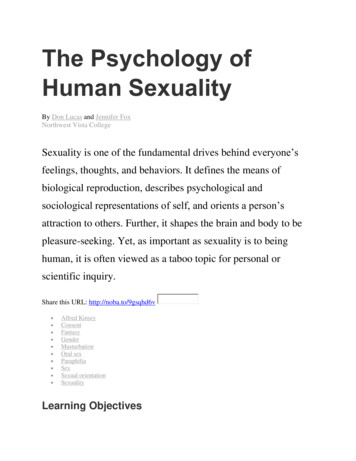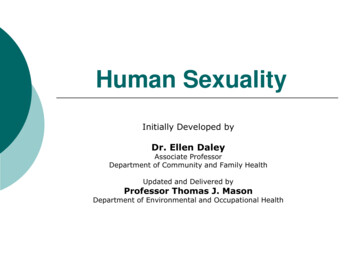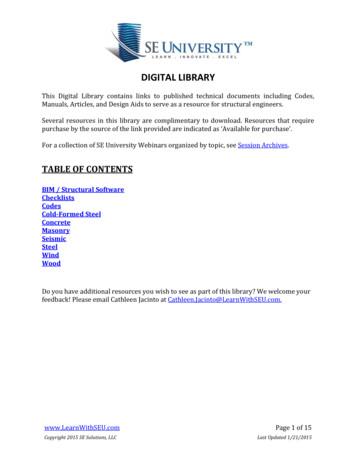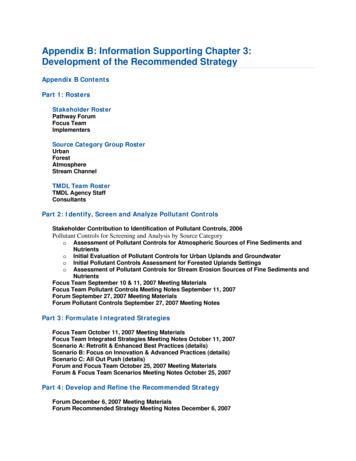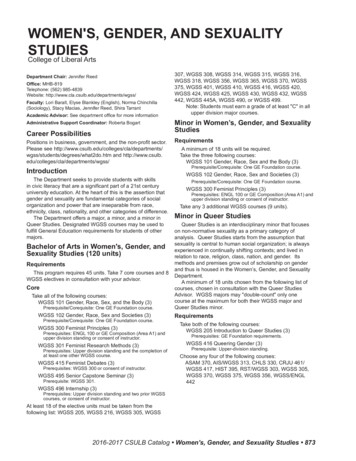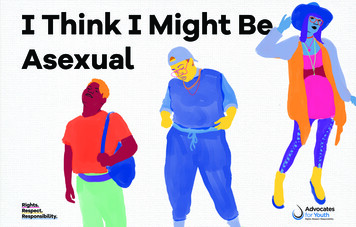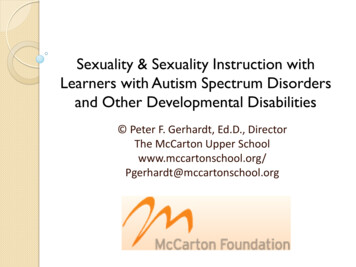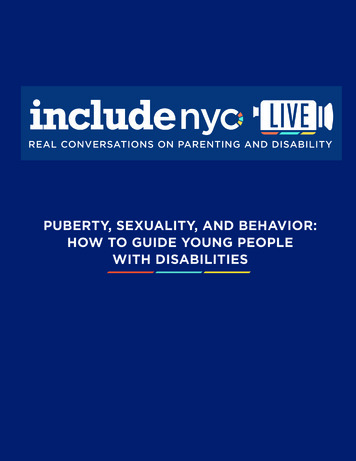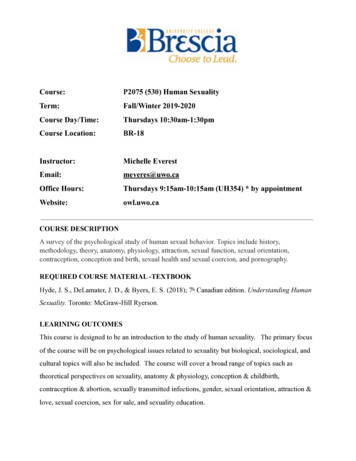
Transcription
Course:P2075 (530) Human SexualityTerm:Fall/Winter 2019-2020Course Day/Time:Thursdays 10:30am-1:30pmCourse Location:BR-18Instructor:Michelle EverestEmail:meveres@uwo.caOffice Hours:Thursdays 9:15am-10:15am (UH354) * by appointmentWebsite:owl.uwo.caCOURSE DESCRIPTIONA survey of the psychological study of human sexual behavior. Topics include history,methodology, theory, anatomy, physiology, attraction, sexual function, sexual orientation,contraception, conception and birth, sexual health and sexual coercion, and pornography.REQUIRED COURSE MATERIAL -TEXTBOOKHyde, J. S., DeLamater, J. D., & Byers, E. S. (2018); 7h Canadian edition. Understanding HumanSexuality. Toronto: McGraw-Hill Ryerson.LEARINING OUTCOMESThis course is designed to be an introduction to the study of human sexuality. The primary focusof the course will be on psychological issues related to sexuality but biological, sociological, andcultural topics will also be included. The course will cover a broad range of topics such astheoretical perspectives on sexuality, anatomy & physiology, conception & childbirth,contraception & abortion, sexually transmitted infections, gender, sexual orientation, attraction &love, sexual coercion, sex for sale, and sexuality education.
Brescia CompetenciesStudents will be able to describe and discuss diverse topics related to human sexuality and thechoices that people have in navigating relationships. Students have the opportunity to reachlevel 4 in the Core Competencies of Communication (Interpersonal Communication), SocialAwareness & Engagement, and Self-Awareness & Development (Personal Growth)Students will be able to assess the historical and current practices related to health and wellbeing in the study of human sexuality. Diverse perspective and inclusive language will beemphasized.Students will be able to understand and explain interdisciplinary research approaches, ethics,and best practices related to the study of human sexuality. Students may develop Level 3abilities in the Core Competencies of Problem-Solving, Self-Awareness & Development(Cognitive Domain), and Valuing as we explore Students will have the opportunity to developlevel 3 abilities in the Core Competencies of Communication (Communicating Ideas), CriticalThinking, and Inquiry & Analysis (Information Literacy).See: es/Teaching Methodology and Expectations of StudentsWeekly lecture templates are provided to students on the course’s Owl Sakai website. It is thestudent’s responsibility to ensure that they collect completed lecture notes (including media) inthe event of absence. Students are encouraged to support each other in this regard. The professorwill be available to answer clarifying questions as needed during weekly office hours, before andafter class, and during classroom breaks. Please note that completed material and media will notbe available to students outside of the classroom session.The Brescia University College student code of conduct information can be found sites/3/delightful-downloads/2014/06/student code of conduct.pdfStudents are not allowed to have a cell phone, or any other electronic devices with youduring tests or examinations. Electronic devices should not be on, or used for academic ornon academic purposes during classroom lectures. Inappropriate use of laptops [or smartphones] during lectures, seminars, labs, etc., creates a significant disruption. As aconsequence, instructors may choose to limit the use of electronic devices in thesesettings. In addition, in order to provide a safe classroom environment, students arestrongly advised to operate laptops with batteries rather than power cords.
COPYRIGHT AND INTELLECTUAL PROPERTYPowerPoint lecture slides and notes, lists of readings, in-class activities, assignment guidelines,and other components of the course materials are typically the intellectual property of theinstructor. Unauthorized reproduction through audio-recording, video-recording,photographing, sharing on social media, or posting on course-sharing websites is aninfringement of copyright and is prohibited. Such action may be considered a Code of Conductviolation and lead to sanctions.Students may not audio/video tape lectures. All recording/image, screenshots, taking,sharing or posting of classroom content, lectures or materials is strictly prohibited.DROP DATES FOR THE 2019-2020 ACADEMIC YEARLast day to drop a first-term half course or a first-term full courseLast day to drop a full course and full-year half courseNovember 12, 2019November 30, 2019EVALUATIONCourse evaluation will consist of four (4) multiple-choice examinations, each worth 25% of thefinal grade. The exams will be in multiple choice formats and will cover material from lecturenotes and the textbook. The exams are NOT cumulative. See lecture schedule.Exam 1 (in class)Exam 2 (in class)Exam 3 (in class)Exam 425%25%25%25%October 17, 2019November 28, 2019February 13, 2020TBAIt is expected that students will attend all classes in order to access complete lecture notes and materials.Students are required to take every test and examination in the course. There are no exceptions to this. Nore-weighting or extra credit assignments are available.Student identification must be brought to all examinations.Final exams will be scheduled by the Registrar’s Office. Students are reminded not to make travelplans prior to receiving finalized examination dates. Accommodation will not be granted for travelthat conflicts with scheduling.Final grades in this course are based exclusively on students’ performance on four non-cumulativeexaminations. Exams may not be re-written, nor will the exams be re-weighted in calculating finalgrades. Grades will not be individually adjusted and there are no opportunities to augment gradesby completing additional assignments.
LECTURE SCHEDULE - This timetable is flexible and may be altered to meet class andlecture requirements.Fall Term (September – December)DateTopicReadingsSeptember 5Course intro/Sexuality in PerspectiveChapter 1September 12Theoretical Perspectives on SexualityChapter 2September 19Sex Research MethodsChapter 3September 26Sexual Anatomy/Cancer of the Sex OrgansChapter 4October 3Sex Hormones and Sexual DifferentiationChapter 5October 10MenstruationChapter 5Conception and Infertility (pp. 131-137; 161-168)Chapter 6October 17EXAMINATION #1October 24Pregnancy and Childbirth (pp. 134-161)Chapter 6October 31Contraception and STIsChapter 7/8November 7READING WEEKNO CLASSNovember 14Contraception and STIsChapter 7/8November 21Sexual ResponseChapter 9November 28EXAMINATION #2December 5Bridging term 1 and term 2: Social Determinants of HealthWinter Term (January – April)January 9Sexuality and the Life Cycle: Childhood and AdolescenceChapter 10Sexuality EducationChapter 19January 16Sexuality and the Life Cycle: AdulthoodChapter 11January 23Attraction, Love and CommunicationChapter 12January 30Gender and SexualityChapter 13February 6Sexual Orientation and Gender IdentityChapter 14February 13EXAMINATION #3February 20CONFERENCE WEEK (Feb 15-Feb 23, 2020)February 27Special topics: GenderMarch 5Variations in Sexual BehaviourChapter 15March 12Special topics: Sexual CoercionChapter 16March 19Special Topics: Sex for SaleChapter 17March 26Sexual Disorders and Sex TherapyChapter 18April 2TBANO CLASSEXAMINATION #4: To be scheduled by the Registrar during the Final Exam Period (Apr 6-Apr 26, 2020).
2019-20 BRESCIA UNIVERSITY COLLEGE ACADEMIC POLICIES AND REGULATIONS1. POLICY REGARDING ACADEMIC ACCOMMODATIONThe complete policy regarding Accommodation for Illness - Undergraduate Students can be found m?Command showCategory&PolicyCategoryID 1&SelectedCalendar Live&ArchiveID #Page 12.Students who have long-term or chronic medical conditions which may impede their ability to completeacademic responsibilities should seek Academic Accommodation through Student Accessibility ages.cfm?PolicyCategoryID 1&Command showCategory&SelectedCalendar Live&ArchiveID #Page 10).Personal commitments (e.g., vacation flight bookings, work schedule) which conflict with a scheduledtest, exam or course requirement are not grounds for academic accommodation.Students who experience an illness or extenuating circumstance sufficiently severe to temporarily renderthem unable to meet academic requirements may submit a request for academic consideration through thefollowing routes:1. Submitting a Self-Reported Absence form provided that the conditions for submission are met;2. For medical absences, submitting a Student Medical Certificate (SMC) signed by a licensedmedical or mental health practitioner;3. For non-medical absences, submitting appropriate documentation (e.g., obituary, police report,accident report, court order, etc.) to their Academic Advisor. Students are encouraged to contacttheir Academic Advisor to clarify what documentation is acceptable.Requests for Academic Consideration Using the Self-Reported Absence PortalStudents who experience an unexpected illness or injury or an extenuating circumstance of 48 hours or lessthat is sufficiently severe to render them unable to meet academic requirements should self-declare using theonline Self-Reported Absence portal. This option should be used in situations where the student expects toresume academic responsibilities within 48 hours. Note that the excused absence includes all courses andacademic requirements within the up to 48 hours, it is not intended to provide an excused absence from asingle course while students fulfill their academic responsibilities in other courses during that time.The following conditions are in place for self-reporting of medical or extenuating circumstances:1. Students will be allowed a maximum of two self-reported absences between September and Apriland one self-reported absence between May and August;2. The duration of the absence will be for a maximum of 48 hours from the time the Self-ReportedAbsence form is completed through the online portal, or from 8:30 am the following morning if theform is submitted after 4:30 pm;3. The excused absence will terminate prior to the end of the 48 hour period if the student undertakessignificant academic responsibilities (writes a test, submits a paper) during that time;4. Self-reported absences will not be allowed for scheduled final examinations; midterm examinationsscheduled during the December examination period; or for final lab examinations scheduled duringthe final week of term;5. Self-report absences may not be used for assessments worth more than 30% of any course;6. Any absences in excess of 48 hours will require students to present a Student Medical Certificate(SMC), or appropriate documentation;7. Students must communicate with their instructors no later than 24 hours after the end of the periodcovered by the Self-Reported Absence form to clarify how they will fulfil the academic expectationsthey may have missed during the absence.Request for Academic Consideration for a Medical AbsenceWhen a student requests academic accommodation (e.g., extension of a deadline, a makeup exam) forwork representing 10% or more of the student’s overall grade in the course, it is the responsibility of thestudent to provide acceptable documentation to support a medical or compassionate claim. All suchACADEMIC POLICIES AND REGULATIONS 1
requests for academic accommodation must be made through an Academic Advisor and includesupporting documentation.Academic accommodation for illness will be granted only if the documentation indicates that the onset,duration and severity of the illness are such that the student could not reasonably be expected tocomplete their academic responsibilities. Minor ailments typically treated by over-the-counter medicationswill not normally be accommodated.The following conditions apply for students seeking academic accommodation on medical grounds:1. Students must submit their Student Medical Certificate (SMC) along with a request for reliefspecifying the nature of the accommodation being requested no later than two business daysafter the date specified for resuming responsibilities. An SMC can be downloaded fromhttp://www.uwo.ca/univsec/pdf/academic policies/appeals/medicalform.pdf ;2. In cases where there might be an extended absence or serious issue, students should submittheir documentation promptly and consult their Academic Advisor for advice during their recoveryperiod;3. Whenever possible, students who require academic accommodation should provide notificationand documentation in advance of due dates, scheduled tests or examinations, and otheracademic requirements;4. Students must communicate with their instructors no later than 24 hours after the end of theperiod covered by the SMC to clarify how they will fulfil the academic expectations they mayhave missed during the absence;5. Appropriate academic accommodation will be determined by the Dean’s Office/AcademicAdvisor in consultation with the course instructor(s). Academic accommodation may includeextension of deadlines, waiver of attendance requirements, arranging Special Exams (makeups), re-weighting course requirements, or granting late withdrawal without academic penalty.The full policy on requesting accommodation due to illness can be viewed fm?Command showCategory&PolicyCategoryID 1&SelectedCalendar Live&ArchiveID #Page 122. ACADEMIC CONCERNSIf you feel that you have a medical or personal challenge that is interfering with your work, contact yourinstructor and Academic Advisor as soon as possible. Problems may then be documented and possiblearrangements to assist you can be discussed at the time of occurrence rather than on a retroactive basis.Retroactive requests for academic accommodation on medical or compassionate grounds are not normallyconsidered.If you think that you are too far behind to catch up or that your work load is not manageable, you shouldconsult your Academic Advisor. If you consider reducing your workload by dropping one or more courses,this must be done by the appropriate deadlines; please refer to the Registrar's services/ or the list of official sessional dates in the AcademicCalendar cfm?SelectedCalendar Live&ArchiveID ).You should consult with the course instructor and the Academic Advisor who can help you consideralternatives to dropping one or more courses. Note that dropping a course may affect OSAP eligibility and/orEntrance Scholarship eligibility.3. ABSENCESShort Absences: If you miss a class due to a minor illness or other problems, check your course outlinefor information regarding attendance requirements and make sure you are not missing a test orassignment. Cover any readings and arrange to borrow notes from a classmate. Contact the courseinstructor if you have any questions.Extended Absences: If you have an extended absence, you should contact the course instructor and anAcademic Advisor. Your course instructor and Academic Advisor can discuss ways for you to catch up onmissed work, and arrange academic accommodations if appropriate and warranted.ACADEMIC POLICIES AND REGULATIONS 2
It is important to note that the Academic Dean may refuse permission to write the final examination in acourse if the student has failed to maintain satisfactory academic standing throughout the year or for toofrequent absence from the class or yPages.cfm?Command showCategory&PolicyCategoryID 5&SelectedCalendar Live&ArchiveID #SubHeading 68 ).4. SCHOLASTIC OFFENCESScholastic offences are taken seriously and students are directed to read the appropriate policy,specifically, the definition of what constitutes a Scholastic Offence fm?Command showCategory&PolicyCategoryID 1&SelectedCalendar Live&ArchiveID #Page 20.Students are responsible for understanding the nature of and avoiding the occurrence of plagiarism andother academic offences. Note that such offences include plagiarism, cheating on an examination,submitting false or fraudulent assignments or credentials, impersonating a candidate, or submitting forcredit in any course without the knowledge and approval of the instructor to whom it is submitted, anyacademic work for which credit has previously been obtained or is being sought in another course in theUniversity or elsewhere. Students are advised to consult the section on Scholastic Discipline forUndergraduate Students in the Academic Calendar.If you are in doubt about whether what you are doing is inappropriate or not, consult your instructor, theAcademic Dean’s Office, or the Registrar. A claim that "you didn't know it was wrong" is not accepted as anexcuse.The penalties for a student guilty of a scholastic offence (including plagiarism) include refusal of apassing grade in the assignment, refusal of a passing grade in the course, suspension from theUniversity, and expulsion from the University.Plagiarism:Students must write their essays and assignments in their own words. Whenever students take an ideaor a passage from another author, they must acknowledge their debt both by using quotation markswhere appropriate and by proper referencing such as footnotes or citations. Plagiarism is a majoracademic offence.All required papers may be subject to submission for textual similarity review to the commercialplagiarism detection software under license to the University for the detection of plagiarism. All paperssubmitted for such checking will be included as source documents in the reference database for thepurpose of detecting plagiarism of papers subsequently submitted to the system. Use of the service issubject to the licensing agreement, currently between The University of Western Ontario andTurnitin.com (http://www.turnitin.com).Computer-marked Tests/exams:Computer-marked multiple-choice tests and/or exams may be subject to submission for similarity reviewby software that will check for unusual coincidences in answer patterns that may indicate cheating.Software currently in use to score computer-marked multiple-choice tests and exams performs asimilarity review as part of standard exam analysis.5. PROCEDURES FOR APPEALING ACADEMIC EVALUATIONSAll appeals of a grade must be directed first to the course instructor. If the student is not satisfied with thedecision of the course instructor, a written appeal is to be sent to the School Chair. If the response of theChair is considered unsatisfactory to the student, they may then submit a written appeal to the Office ofthe Dean. If the student is not satisfied with the decision of the Dean, they may appeal to the SenateReview Board Academic (SRBA), if there are sufficient grounds for the appeal and if the matter fallswithin the jurisdiction of the SRBA. For information on academic appeals consult your Academic Advisoror see the Student Academic Appeals – Undergraduate in the Academic ges.cfm?Command showCategory&PolicyCategoryID 1&SelectedCalendar Live&ArchiveID #Page 14.ACADEMIC POLICIES AND REGULATIONS 3
Note that final course marks are not official until the Academic Dean has reviewed and signed the finalgrade report for the course. If course marks deviate from acceptable and appropriate standards, theAcademic Dean may require grades to be adjusted to align them with accepted grading practices.6. PREREQUISITESUnless you have either the prerequisites for a course or written special permission from the Dean to enroll init, you will be removed from the course and it will be deleted from your record. This decision may not beappealed. You will receive no adjustment to your fees in the event that you are dropped from a course forfailing to have the necessary prerequisite(s).7. SUPPORTSupport ServicesThe Brescia University College Registrar’s website, with a link to Academic Advisors, is es/ . Students can access supports through Brescia’sStudent Life Centre (http://brescia.uwo.ca/life/student-life/) and Learning Skills Services at Western(https://www.uwo.ca/sdc/learning/)Mental Health and WellnessStudents may experience a range of issues that can cause barriers to your learning, such as increasedanxiety, feeling overwhelmed, feeling down or lost, difficulty concentrating and/or lack of motivation. Servicesare available to assist you with addressing these and other concerns you may be experiencing. You canobtain information about how to obtain help for yourself or others through Mental Health & Wellness atBrescia /) and Health and Wellness at Western,http://uwo.ca/health/mental wellbeing/index.html.Sexual ViolenceAll members of the Brescia University College community have a right to work and study in an environmentthat is free from any form of sexual violence. Brescia University College recognizes that the prevention of,and response to, Sexual Violence is of particular importance in the university environment. Sexual Violenceis strictly prohibited and unacceptable and will not be tolerated. Brescia is committed to preventing SexualViolence and creating a safe space for anyone in the Brescia community who has experienced SexualViolence.If you or someone you know has experienced any form of Sexual Violence, you may access resources ions of this document were taken from the Academic Calendar, the Handbook of Academic and Scholarship Policyand the Academic Handbook of Senate Regulations. This document is a summary of relevant regulations and does notsupersede the academic policies and regulations of the Senate of the University of Western Ontario.ACADEMIC POLICIES AND REGULATIONS 4
Instructor: Michelle Everest Email: meveres@uwo.ca Office Hours: Thursdays 9:15am-10:15am (UH354) * by appointment Website: owl.uwo.ca _ COURSE DESCRIPTION A survey of the psychological study of human sexual behavior. Topics include history,

